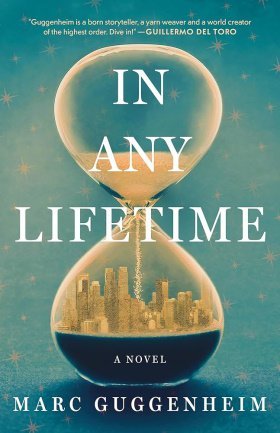“You’re right. The coin flip is just a convenient illustration I use with laypeople.”
She rears back. “Laypeople? You wound me, sir,” she says in mock offense.
“But you happen to be absolutely right,” Jonas continues. “The multiverse does prefer efficiency, which it achieves by limiting branch points—instances where circumstances could go right or left and, therefore, birth a new universe—by constraining the number of times that it happens.”
“How?” she asks.
“By favoring certain outcomes. Which limits the total number of realities in the multiverse from the impossibly infinite to manageably so.”
“And how do you know that?”
He tells her about his Many Worlds Proof. The Nobel Prize. The night in Stockholm. The accident. He doesn’t know how he manages to get it all out and not have his voice tremble.
“I’m so sorry,” she says. There’s more than sincerity in her voice. Jonas senses experience. Eva has trod this unfortunate emotional territory.
“I devised a means to travel between realities,” he says. “My hope is to find one where Amanda is still alive.”
“Your hope? I would think there would be . . . well, I would think there would be a lot. I mean, in a universe of infinite universes.”
“Yes. But you’re forgetting something.”
Eva brightens. “The universe favors . . .”
“Certain outcomes, yes.”
Eva takes a pull from her drink, evidently thinking hard on all that Jonas has unloaded on her. “What happens,” she ventures, “if you find a world where your wife is alive . . . but so are you?”
“I don’t know,” he admits. “I think it’s unlikely, given the universal bias I mentioned.”
“But what if?” she insists.
“Then . . .” Jonas’s voice trails off. “I guess that would fall under the category of a ‘quality problem.’”
“It would certainly make for the world’s most interesting love triangle.”
“Maybe I’ll write a book about it,” he jokes. “Get a Pulitzer to go with my Nobel.”
Eva is still working to absorb all this, wrestling with whether to accept what he’s told her and what she’s observed on his forearm or to hold fast to common sense. “I can’t even begin to fathom the energy expenditure required to jump realities.”
“Of course you can,” he offers. “Consider where we are.”
“Switzerland.”
“Meyrin, Switzerland,” he specifies.
“The Large Hadron Collider,” she realizes aloud, the words tumbling out in a whisper.
He points at her—exactly—before saying, “My body is now suffused with quantum energy. The process essentially unanchored me from my reality, allowing me to slip into yours.”
Her beer bottle empty, Eva—saucer eyed—reaches forward to drain Jonas’s. “If that’s true”—Jonas can see her mind grasping—“then why aren’t you continuing to . . . ‘slip,’ to use your word? What keeps you in this reality?” But she doesn’t wait for Jonas to answer as her understanding gains momentum. “In fact, what’s to keep you from slipping realities forever?”
“This.” Jonas holds up his hand, showing her his ring. “I call it my ‘tether.’ It’s the only piece of nonorganic matter that can make the trip with me.”
“Nonorganic?”
“Anything synthetic,” Jonas confirms. “I even had to have my fillings taken out and replaced with silver.”
“But why?” she asks.
“Remember, we’re dealing with radiation, essentially. Quantum radiation, yes, but still. Different types of matter absorb and retain radiation differently. When I first started out, all my computer models were . . .” He searches for the word.
“Totally wack?” Eva offers.
“To use the technical term.” This time, they both share a smile. A moment. “In any case, the model results changed when I only factored in organic materials.”
“Except for your ‘tether.’”
Jonas points to it, resting on his finger. “It’s different from everything else because it’s regulating the radiation in question. As long as I’m wearing it, I’m rooted in whichever universe I’m standing in.”
“And if you take it off?”
Jonas flutters his hand upward, fingers wagging. “I move through universes like a feather on the wind.”
“And, what, you land when you put it back on?”
“Actually, it takes a universe or two to settle.”
“Settle?”

























